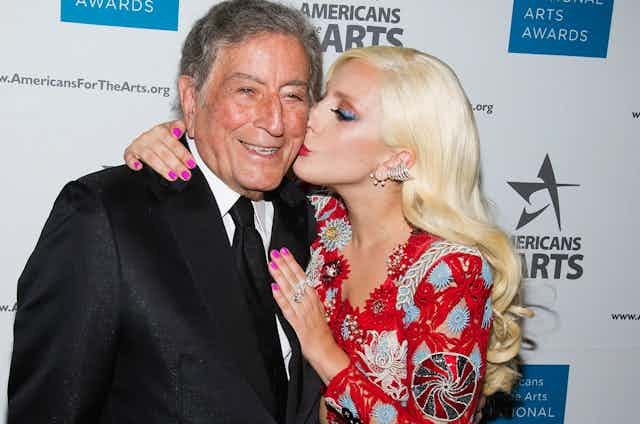In the history of American popular music, there have been few luminaries as enduring and innovative as Tony Bennett.
With a career that spanned almost 80 years, Bennett’s smooth tones, unique phrasing and visionary musical collaborations left an indelible mark on vocal jazz and the recording industry as a whole.
That his death at the age of 96 on July 21, 2023, was mourned by artists as varied as Keith Urban, Ozzy Osbourne and Harry Connick Jr. should come as no surprise. Yes, Bennett was a jazz crooner. But if his voice was always a constant – even late into his 80s, way past an age when most other singers have seen their vocal abilities diminish – then his embrace of the contemporary was every bit a facet of Bennett’s appeal.
Vocal innovator
Bennett’s journey is a testament to the power of daring innovation.
From the early days of his career in the 1950s to his final recordings in the early 2020s, he fearlessly explored new musical territories, revolutionizing vocal jazz and captivating audiences across generations.
His vocal style and phrasing were distinctive and set him apart from other artists of his time. He utilized a delayed or “laid-back” approach to falling on the note, a technique known as “rubato.” This created a sense of anticipation in his phrasing, adding an element of surprise to his performances. Through Bennett’s skilled use of rubato, he was able to play with the tempo and rhythm of a song, bending and stretching musical phrases to evoke a range of emotions. This subtle manipulation of timing gave his songs a natural and conversational quality, making listeners feel as though he was intimately sharing his stories with them.
Armed with this silky, playful voice, Bennett found fame fairly early on in his career, delivering jazz standards alongside the likes of Mel Tormé and Nat King Cole. By the mid-1960s, he was being touted by Frank Sinatra as “the best singer in the business.”

But his musical style fell out of fashion in the 1970s – a lean period during which Bennett almost succumbed to a drug overdose. Then, in the 1990s, Bennett found a new audience and set off a series of collaborations with contemporary musical stars that would become the standard for his later career.
No genre of artistry was deemed off-limits for Bennett. “Duets: An American Classic,” released to coincide with his 80th birthday in 2006, saw collaborations with country stars such as k.d. lang and the Dixie Chicks – now known as the Chicks – and soul legend Stevie Wonder, alongside kindred jazz spirits such as Diana Krall. “Duets II,” a 2011 follow-up, saw further explorations with the likes of Aretha Franklin, Queen Latifah, Willie Nelson and Amy Winehouse, in what would become the British singer’s last recording.
But his cross-generational, cross-genre and cross-cultural appeal is perhaps best exemplified by his collaborations with Lady Gaga, first on the 2014 Grammy-winning album “Cheek to Cheek.” The recording brought together two artists from different generations, genres and backgrounds, uniting them in a harmonious celebration of jazz classics. The collaboration not only showcased each one’s vocal prowess, but also sent a powerful message about the unifying nature of music.
Lady Gaga, a pop artist with avant-garde leanings, might have seemed an unlikely partner for Bennett, the quintessential jazz crooner. Yet their musical chemistry and mutual admiration resulted in an album that mesmerized audiences worldwide. “Cheek to Cheek” effortlessly transcended musical boundaries, while the duo’s magnetic stage presence and undeniable talent enchanted listeners.
The successful fusion of jazz and pop encouraged artists to experiment beyond traditional boundaries, leading to more cross-genre projects across the industry – proving that such projects could go beyond one-off novelties, and be profitable at that.
Timeless artistry
Bennett’s embrace of contemporary artists did not mean that he abandoned his own musical self. By blending traditional jazz with contemporary elements, he managed to captivate audiences across generations, appealing to both longtime fans and new listeners.
One key aspect of Bennett’s success was his ability to embody the sentiment of old America, reminiscent of artists like Sinatra, Billie Holiday and Louis Armstrong, while infusing contemporary nuances that resonated with the human condition of a more modern era. His approach to music captured both the essence and struggle of America, giving his songs a timeless and universal appeal. Moreover, his voice conveyed familiarity and comfort, akin to listening to a beloved uncle.
Bennett’s albums stood out not only for his soulful voice and impeccable delivery but also for the way he drew others from varied musical backgrounds into his world of jazz sensibilities. As a producer, he recognized the importance of nurturing creativity and bringing out the best in artists.
Meanwhile, Bennett’s approach to evolving his own sound while preserving its essence sets him apart as an artist. Fearless in his pursuit of innovation, he delved into contemporary musical elements and collaborated with producers to infuse new sonic dimensions into his later albums. The result drew listeners into an intimate and immersive, concert-like acoustic journey.
Depth of emotion
The greats in music have an ability to speak to the human experience. And either in collaboration with others or on his own, Bennett was able to achieve this time and time again.
His albums were successful not only due to their technical brilliance and musicality but also because Bennett’s voice conveyed a depth of emotion that transcended barriers of time and culture, touching the hearts of listeners from various backgrounds. There was a universality in his music that made him a beloved and revered artist across the globe.
Bennett’s life spanned decades of societal upheavals in the United States. But in his music, listeners could always find beauty in challenging times. And as the 20th- and 21st-century American music industry went through its own revolutions, Bennett’s artistic evolution mirrored the changes, cementing his place as a music icon who defies the boundaries of time and trends.

